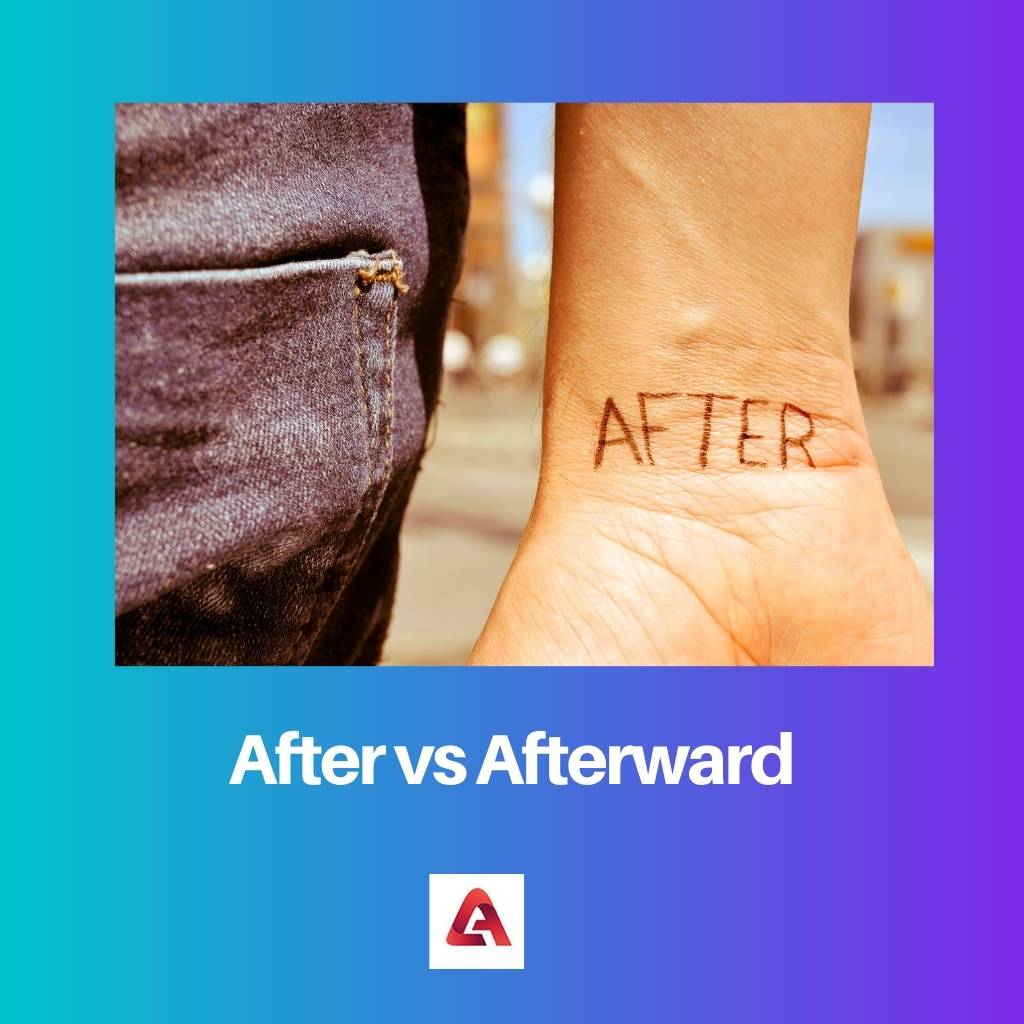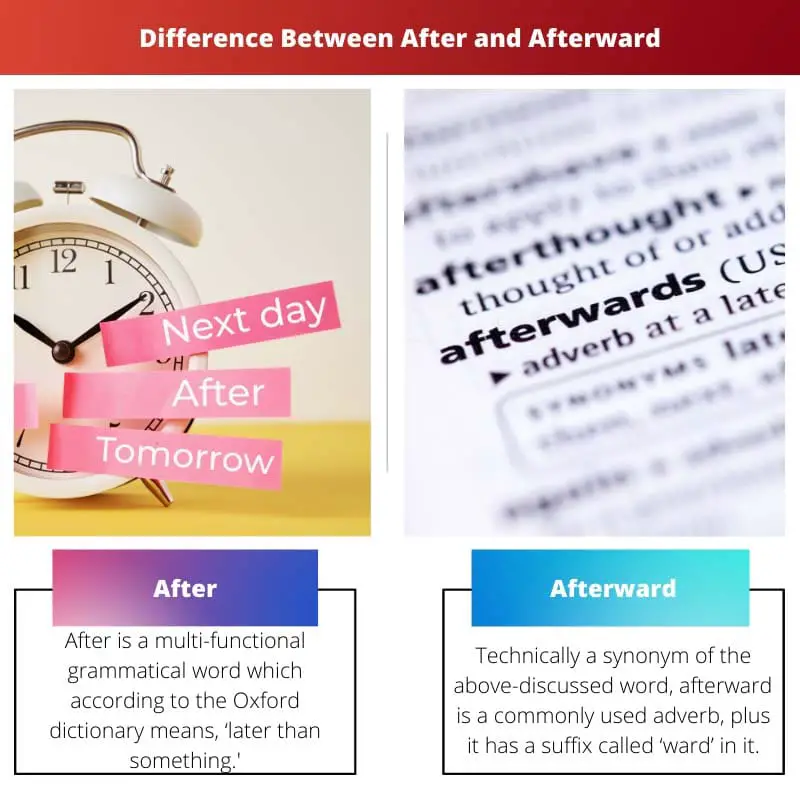The word ‘after’, as elaborated by the Cambridge English dictionary, is a primarily used preposition by English writers and speakers to describe later in position, place, or time.
‘Afterward’, on the other hand, is practically labelled as the synonym of the former word by Cambridge and Oxford, but the usage of this word is limited to its functionality as an adverb.
Both terms are used interchangeably, but there are some fine differences between them that change the functionality of the sentence in which they are being used.
Key Takeaways
- “After” functions as a preposition, conjunction, or adverb, connecting events in time, whereas “afterward” exclusively serves as an adverb denoting a later time.
- Both “after” and “afterward” indicate a subsequent event or time, but “after” provides more specificity by directly linking actions or events.
- The spelling “afterwards” is more common in British English, while in American English, “afterward” prevails; both convey the same meaning.
After vs Afterward
The difference between After and Afterward is that ‘After’ is used as a preposition when denoting a place or time, or position of the subject with respect to something else. For example, Lang Avenue comes after the departmental store across Raymond Street. This statement highlights the position of the subject with respect to an object. Whereas ‘afterwards’ is never used as a preposition. It is limited to adverb functionality.

These words are very similar when it comes to their fundamental meaning. Native English speakers mix and interchange these words to make common grammatical mistakes.
The word ‘after’ is used to specify the position of the subject and the term is used to generalize the time span and position “not” specifically.
In simple terms, it holds multimodal usage depending on the sentence and is a generalized term for specifying a position with respect to something else.
Afterwards or afterwards, on the other hand, is an adverb that helps the verb to describe itself specifically and accurately.
For example, ‘I am sleeping, will do my homework afterwards’ In this sentence, the subject specifies that homework is absolutely the last thing he will be doing with respect to the verb ‘sleeping’.
Comparison Table
| Parameters of Comparison | After | Afterward |
|---|---|---|
| Function | After is used primarily as a preposition to describe the subject or noun. But it has many other functionalities depending upon requirement. | Afterward is used only as an adverb to accurately describe the action verb used in a sentence. |
| Mode of functionality | Primarily as a preposition. Also used as an adverb, conjunction, adjective, verbal auxiliary or a noun. | Used only as an adverb. |
| Inclusion of affixes | No affixes are used in this word. | The suffix “ward” is used in this word. |
| Pronunciation | UK: ˈɑːf.tər, US: ˈæf.tɚ | UK: ˈɑːf.tə.wəd ,US: ˈæf.tɚ.wɚd |
| Usage in sentence | Preposition usage with respect to later time; Let’s visit Tokyo after we graduate. | Adverb usage in a sentence; We had tea, and afterward we sat in the garden for a while. |
What is After?
After (etymology: Old English æfter, of Germanic origin; related to Dutch achter) is a multi-functional grammatical word which, according to the Oxford dictionary, means ‘later than something; the following something in time’.
It has got another meaning which actually mentions the position and place rather than time ie, ‘next to and following somebody/something in order or importance’.
This word can alternatively function as a conjunction to connect sentences or colloquially as an adverb by Native speakers. Depending on the requirements of place, time or maybe glueing a few sentences ornamentally, this word is used quite a lot in both written and spoken English.
According to the international OEC (Oxford English Corpus) ranking, the word ‘after’ is the 82nd most-used word and is labelled as one of the most-used prepositions throughout the world of English speakers.

What is Afterward?
Technically a synonym of the above-discussed word, afterwards (Old English æfterwearde from æft “after” (see aft) + -weard suffix) is a commonly used adverb, plus it has a suffix called ‘ward’ in it.
Well, there is actually a minute difference between the literal meanings of after and afterwards. When we take consideration of only time after refers to a more generalized description whereas afterwards specifies a proper and immediate time, understanding this with an example would be easier.
E.g.:- I will buy a car after I graduate. In this sentence, ‘after’ specifies that the subject will buy a car anytime once his graduation is done.
But, if the sentence goes as, ‘I will complete my graduation and buy a car afterwards’, here the word ‘afterward/s’ highlights the fact that the subject will immediately buy a car as soon as he completes his graduation.
Afterwards and afterwards are referred to as the same colloquially or informally in many English-speaking parts of the world.

Main Differences Between After and Afterward
- After is mostly used as a preposition to define the time, place and position of the noun, but it can occasionally be used as a conjunction, adverb, noun and even as an adjective. Whereas, afterwards is an adverb and doesn’t have multi-functional ability.
- The word ‘afterwards’ has an affix ie, suffix- ward, attached to it, whereas the word ‘after’ does not have any affix attached to it.
- Both the words are technically synonyms to each other, but after is used as a more general term, afterwards is more accurate and states the time of the verb more precisely. However, many native English speakers use them interchangeably.
- The word afterward is actually a derivative of the original word after. So, afterward is the successor of the after when we consider their nomenclature and etymology.
- The word after is pronounced as ˈɑːf.tər whereas, afterward is pronounced as ˈɑːf.tə.wəd.


The historical context and linguistic significance of both terms are thoroughly explained.
The scholarly treatment of the topic ensures an enhanced comprehension of ‘after’ and ‘afterward’.
The analysis of ‘after’ and ‘afterward’ is both enlightening and instructive.
The article offers a profound and systematic analysis of these linguistic terms.
The distinction between ‘after’ and ‘afterward’ is succinctly and elegantly presented.
This article clearly expounds upon the diverse functions of ‘after’ and ‘afterward’.
The insightful research and in-depth discussion of these terms resonates with a high level of linguistic scholarship.
The example provided concerning the specific usage of ‘after’ and ‘afterwards’ is very insightful.
This content is a brilliant dissection of ‘after’ and ‘afterward’.
The practical and theoretical depth of the analysis is commendable.
Thank you for providing a comprehensive and detailed analysis of the terms ‘after’ and ‘afterward’. The usage of these terms has been clarified effectively.
The elucidation of the grammar and usage of ‘after’ and ‘afterward’ is of exceptional quality.
The in-depth analysis and clear language employed in explaining the linguistic function of both terms is praiseworthy.
The comparison table effectively showcases the subtle differences between ‘after’ and ‘afterward’.
The etymology and usage of ‘after’ and ‘afterward’ are eloquently explained.
The clear explanation of the differences between ‘after’ and ‘afterward’ is greatly appreciated.
This content is highly informative and thought-provoking.
The explanation provides clarity and enables a better understanding of the terminology.
The global perspective provided regarding the usage of ‘after’ and ‘afterward’ is commendable.
The article provides a highly sophisticated examination of the terms ‘after’ and ‘afterward’.
The article succeeds in providing a comprehensive understanding of the nuanced differences between ‘after’ and ‘afterward’.
The etymology and phonetic information is beneficial for those seeking to enhance their understanding of the English language.
The discussion on ‘after’ and ‘afterward’ is highly enriching and instructional.